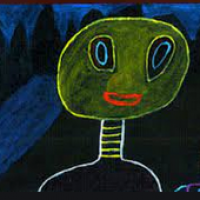Christophe Pays - "Ellipse"
A new release on emu. I'd never heard of Pays before, and can't find much info on him. There's no translate button that I can find on his site. However, everyone should give this album a listen. Pays plays a non-traditional jazz guitar (read: doesn't sound like Grant Green or any of his imitators) to great success. I absolutely love the interplay between piano and bass clarinet, and Pays does a genius show of weaving his notes in between that conversation. The album has a bit of the modern ECM sound to it, but also something nu-jazz about it, like Brian Blade's "Season of Changes". To me, that this album is released right when the weather is foreshadowing winter, it can't be a coincidence. Here's his emu page...
http://www.emusic.com/album/Christophe-Pays-Ellipse-MP3-Download/11686238.html
And here's his site, with some free tracks and live performances...
http://www.christophepays.com/Ellipse/Disque.html
http://www.emusic.com/album/Christophe-Pays-Ellipse-MP3-Download/11686238.html
And here's his site, with some free tracks and live performances...
http://www.christophepays.com/Ellipse/Disque.html

Comments
Christophe Pays :Guitars and compositions.
He started the guitar as an autodidact in adolescence and plays in
rock bands. He studied jazz at the EDIM, with teachers as Daniel Beaussier Manu Pekar, Vincent Jacqz,
Patrick Fradet and especially Eric Schultz. At the same time, he took courses of analysis and writing with Christine
Mennesson Conservatory of Fontenay-sous-bois. In 1999, he met the singer Mia Livolsi and starts
a trio of voice, guitar, cello on traditional Italian songs. In 2000 he moved to Nantes
and played with the Brazilian percussionist Pedro Martinez. Gradually, he develops his own compositions and
In 2003, he founded Ellipse.
William HAZEBROUCK: Piano
After studying at the conservatories of Nantes and Tours, he obtained a
Master of Music and Musicology working on the music of composer Morton Feldman, then it follows
DEA seminar at IRCAM. In 1998 he founded the escapades Sextet, with whom he created the show in 2000
Travel in large Garabagne by Henri Michaux. In 2001 he wrote the music for the show No Button
Ground. It occurs in the trio of Olivier Themines, duo with saxophonist J. Aussanaire in all
The Breath of the soil, and participates in the project The Don Cherry's gift initiated by P. Menuau and uniting musicians
French and Benin.
Line MOULLIER Cello and voice
is characterized mainly by its eclecticism, wealth and openness
his musical career. Having started the cello at the Music School of Philadelphia in 1995, she
produced classical concerts with Ida quartet Graslin theater, and with the chamber orchestra as
soloist in the Vivaldi double concerto. She participates in the creation of a piece of Horowitz in the context of
biweekly writers in the theater of the Sphinx. To its credit, there is also cello improvisations
solo, a collaboration with writer Jean Rouaud for a concert reading in Cambon, or registrations
Orange Blossom and Diane K.
Olivier THEMINES: Clarinet
He began clarinet child and, after a brief stint at the conservatory of Caen
and the Faculty of Musicology of Tours, founded the Olivier Themines Trio. It also participates in multiple
jazz ensembles: the Family Life Mahieux Quartet, the pianist Rene tentet Bottlang Artlongo the Xtet A follow
the brass and tet Cin
I was genuinely surprised that I not only didn't hate that vocal section, but enjoyed it as an element to the song. I don't know if it was knowing in advance that it was there and sufficiently bracing myself for it or that Pays' composition skills are strong enough to pull it off, but the vocal section on the first tune works for me. But, yeah, typically that kind of inclusion usually results in some awful melodrama. Maybe it'll grow on you, maybe not. If not, it's not hard for me to empathize; off the top of my head, the only other time a vocal interlude has worked for me like that was on Brian Blade's "Perceptual" (I forget which song, but somewhere near or at the end of the album).
Cheers.